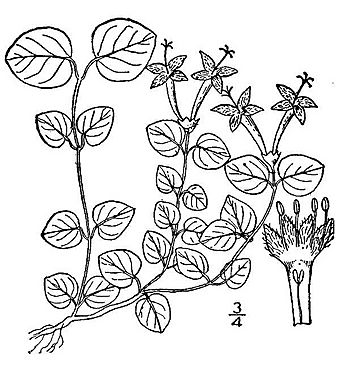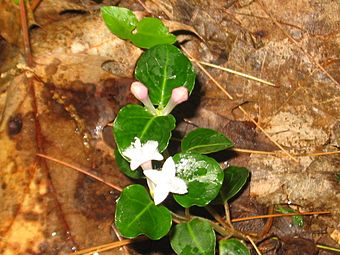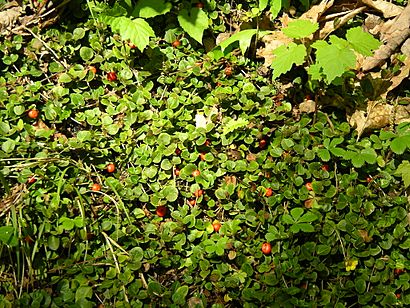Partridge berry facts for kids
Quick facts for kids Partridge berry |
|
|---|---|
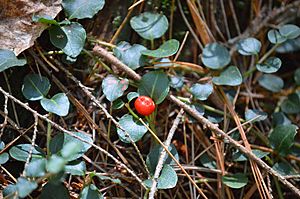 |
|
| Leaves and berry | |
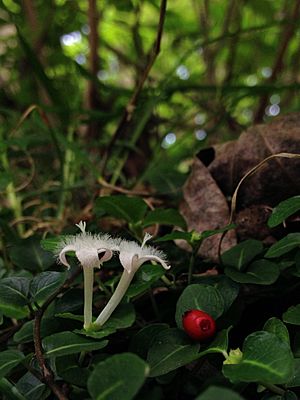 |
|
| Flowers and berry | |
| Scientific classification | |
| Genus: |
Mitchella
|
| Species: |
repens
|
The partridge berry (scientific name: Mitchella repens) is a well-known plant. It's a small, creeping plant that grows close to the ground. You can find it in North America. This plant is a type of woody herb and belongs to the madder family, also known as Rubiaceae.
Contents
What's in a Name?
The famous scientist Carl Linnaeus was one of the first to describe the partridge berry. Its scientific species name, repens, comes from Latin. It means "creeping," which perfectly describes how this plant grows along the ground.
People have many common names for this plant. The most popular one is partridge berry. Other names include two-eyed berry and running fox. In the Mohawk language, it's called Noon kie oo nah yeah.
What Partridge Berry Looks Like
Partridge berry is an evergreen plant, meaning its leaves stay green all year. It doesn't climb but spreads out, usually growing no taller than 6 cm (about 2.4 inches). Its stems can creep along the ground for 15 to 30 cm (6 to 12 inches).
Its dark green leaves are shiny and shaped like an egg or a heart. Each leaf has a pale yellow line down the middle, called a midrib. The leaves grow in pairs on short stems. Sometimes, roots can grow from the stems, helping the plant spread and form loose, wide mats.
Flowers and Berries
The partridge berry has small, white, trumpet-shaped flowers. They grow in pairs, and each pair shares a fuzzy green base. Each flower has four white petals. It also has a central part called a pistil and four smaller parts called stamens.
Interestingly, partridge berry plants have two types of flowers. Some flowers have a long pistil and short stamens. Others have a short pistil and long stamens. This special setup helps the plants avoid fertilizing themselves, making sure they mix their genes with other plants.
The ovaries of the two flowers in a pair grow together to form one berry. That's why you can see two bright red spots on each berry! These spots are like tiny reminders of the two flowers that joined to make it.
The fruit turns ripe between July and October. It can even stay on the plant through the winter. Each berry is a drupe and can hold up to eight seeds. You won't find tons of berries on one plant, but they are an important food source for many animals. Birds like ruffed grouse and wild turkey eat them. Foxes, mice, and skunks also enjoy these berries. Sometimes, White-tailed deer will munch on the leaves.
How Partridge Berry Reproduces
Partridge berry mostly reproduces by spreading its stems. These stems can grow roots and branch out, forming new plants. This helps the plant create wide colonies that cover the ground.
Where Partridge Berry Grows
You can find partridge berry all over eastern North America. It grows from southeastern Canada down to Florida and Texas. It even reaches as far south as Guatemala. This plant likes to grow in dry or moist forests, along stream banks, and on sandy hillsides.
How People Use Partridge Berry
People often grow partridge berry because its bright red berries and shiny green leaves look very pretty. It's a great plant to use as a ground cover in shady spots in gardens. It's usually grown from cuttings, not seeds, because cuttings are easier.
In the past, people collected a lot of partridge berry plants for Christmas decorations. This sometimes caused problems for the plant populations in certain areas.
Native American women, especially from the First Nations, used to make a special tea from the leaves and berries. They would drink this tea during childbirth.
Sometimes, partridge berry plants are grown inside terrariums, which are like small indoor gardens in glass containers. The bright red berries are safe to eat, but they don't have much flavor. They taste a little bit like wintergreen and are sometimes compared to cranberries, even though they are not closely related.


